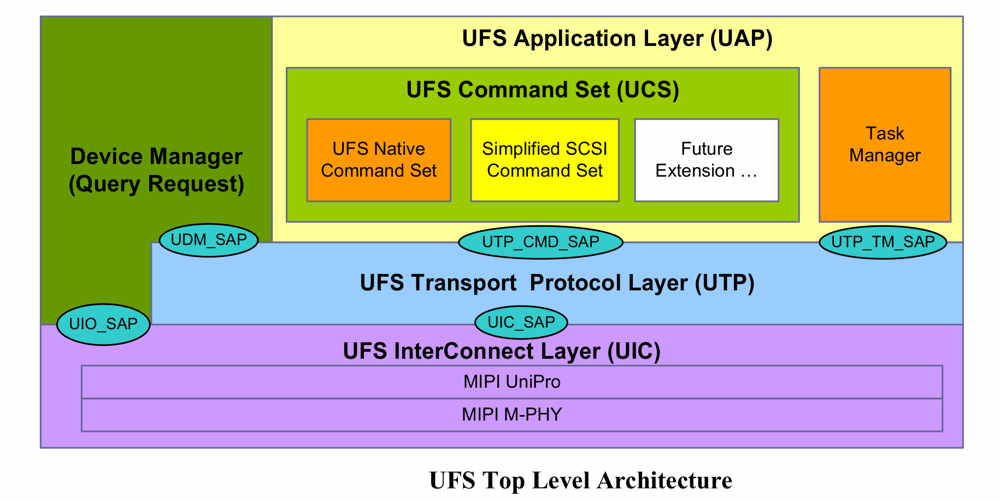JEDEC Publishes JESD220-2 Universal Flash Storage Card Extension Standard
For use in computing and mobile systems such as smart phones and tablets
This is a Press Release edited by StorageNewsletter.com on April 7, 2016 at 2:39 pmJEDEC, Solid State Technology Association, announced the publication of JESD220-2 Universal Flash Storage (UFS) Card Extension Standard.
Universal Flash Storage (UFS) top level architecture
(Copyright JEDEC)
The removable memory card standard standardizes functionality that aligns with the popular UFS embedded device standard. JESD220-2 is available for free download from the JEDEC website.
UFS is a high performance interface designed for use in computing and mobile systems such as smart phones and tablets where power consumption needs to be minimized. Its high speed serial interface and optimized protocol enable significant improvements in throughput and mobile system performance. The new UFS card standard provides a removable storage solution while maintaining sequential and random IO/s performance that is critical for future mobile markets. Even using a single lane the UFS 1.0 card offers 600MB/s interface speed in both directions and a state-of-the-art queuing mechanism to further increase system throughput.
Features of the UFS card are the same as those defined in the UFS 2.0 embedded device standard:
-
Based on the UFS 2.0 standard and compatible with the UFS HCI 2.0 standard
-
Supports MIPI M-PHY HS-Gear3, HS-Gear2 (optional), and PWM-Gear1
-
A detailed mechanical definition is defined by the JEDEC MO-320A outline
-
Features common to embedded UFS 2.0 devices:
-
Support for multiple logical units, each with configurable characteristics
-
Reliable write and background operations
-
Secure operations such as purge and erase to enhance data security
-
Includes write protection options, including permanent and power-on write protection
-
Provides task management and power management functionality
To optimize for cost, complexity, and assist with rapid implementation of the new UFS 1.0 card standard, product designers and engineers should note the following key areas of simplification from the embedded UFS 2.0 standard:
-
MIPI M-PHY single-lane operation
-
HW RESET signal not supported in UFS card
-
Ref_clock of 26Mhz and 19.2Mhz only
-
VCCQ supply eliminated
-
Boot capability not supported at this time
“JEDEC’s new UFS card standard offers many of the features and much of the same high-end functionality as the UFS embedded device standard, but in a convenient, removable card format that would be well suited for most mobile devices,” said Mian Quddus, chairman, board of directors, JEDEC, and C-64 Committee for Embedded Memory Storage and Removable Memory Cards. He added: “JC-64 is dedicated to fulfilling the storage requirements of the mobile industry by offering product designers a range of options to better meet their needs.“
“Embedded UFS has been proven to deliver the best performance and highest power efficiency of any storage in the mobile industry,” said Kenny Han, VP, NAND product planning, Samsung Electronics Co. Ltd. “It is only natural that this exemplary performance is being passed on to removable cards in extending the functionality of consumer mobile devices. The new UFS card standard will more than meet the needs of technologies that are the vanguard of the mobile industry today like 360-degree video and Drones with multiple 4K/8K recording cameras as well as smartphones which are beginning to evolve into intelligent hubs for IoT and mobile environments.“















 Subscribe to our free daily newsletter
Subscribe to our free daily newsletter


